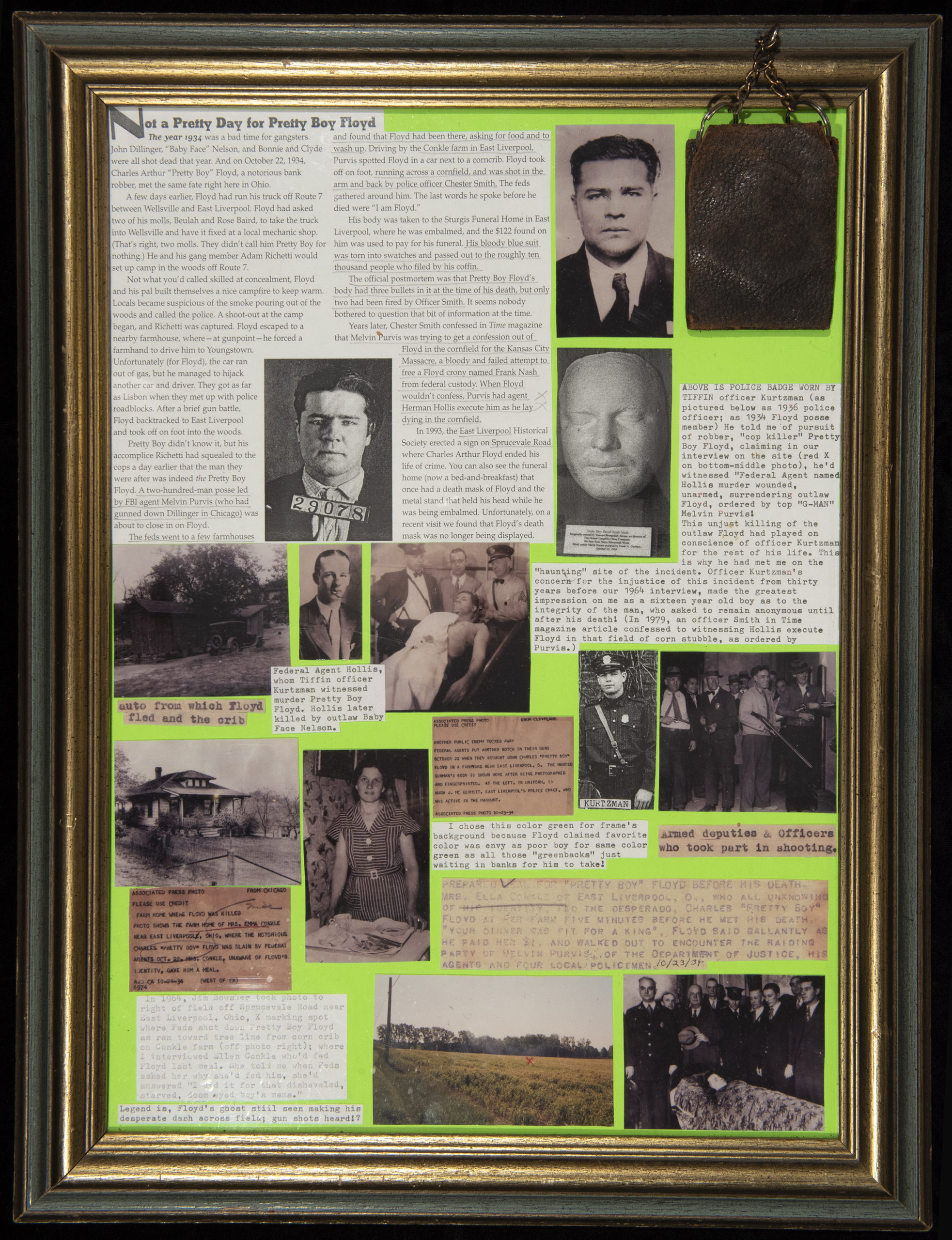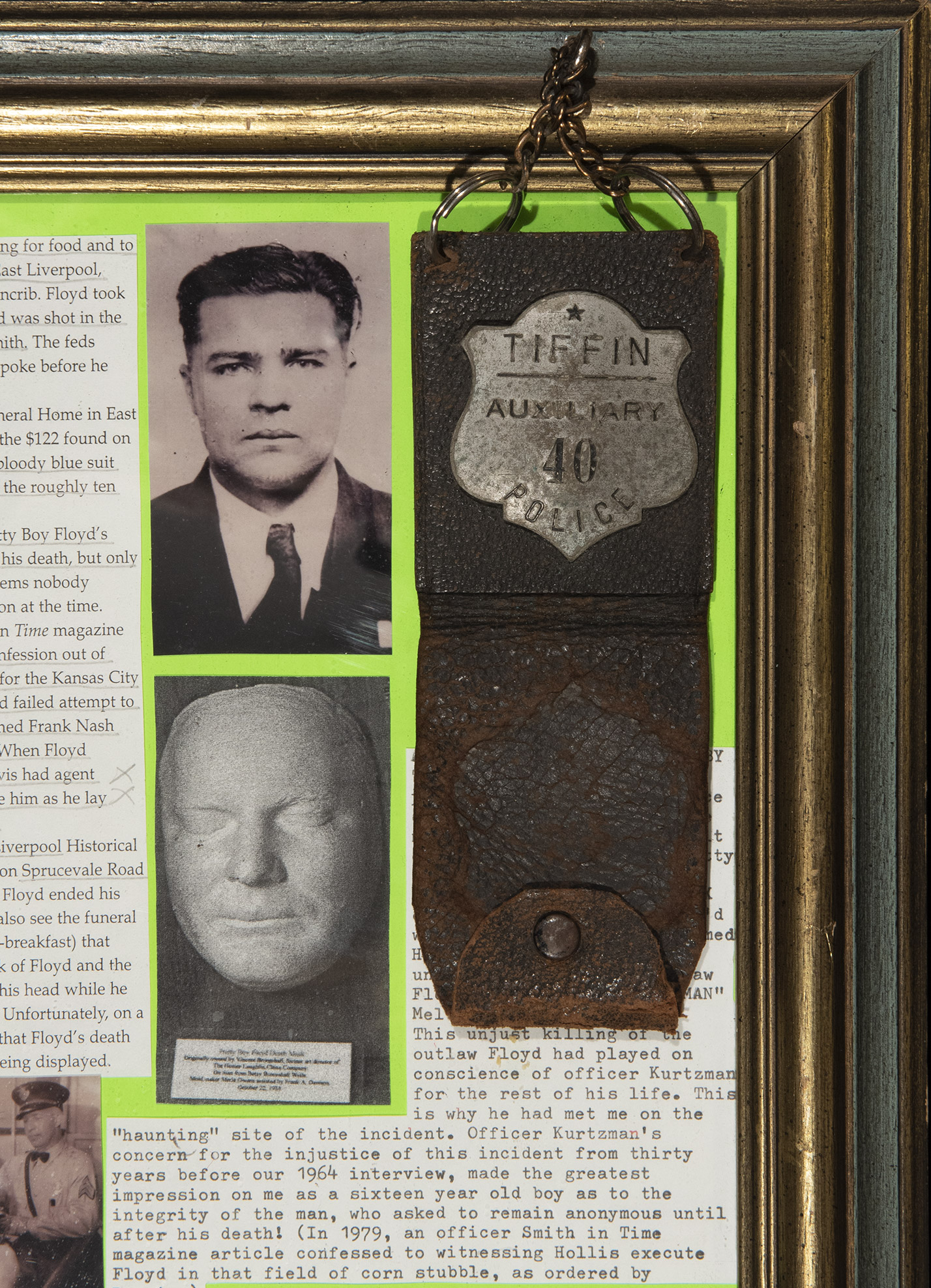Known for his Robin Hood-like persona, Floyd became a folk hero to many impoverished Americans who viewed him as a modern-day outlaw fighting against the oppressive banks. Born Charles Arthur Floyd in 1904, he grew up in the rural landscapes of Oklahoma, a region plagued by poverty and hardship during the early 20th century. His rise to infamy began in the 1920s when he turned to a life of crime, quickly earning the nickname "Pretty Boy" for his youthful appearance and dapper style. Despite his violent escapades, Floyd's legacy remains a subject of debate, with some remembering him as a hero and others as a dangerous criminal. During the height of the Great Depression, Pretty Boy Floyd's exploits captured national attention. His crimes were not just acts of personal gain but were often seen as a form of rebellion against the financial institutions that many blamed for the economic collapse. Floyd's ability to evade law enforcement for years added to his mystique, making him a symbol of resistance for the downtrodden. While his actions were undeniably criminal, stories of him sharing stolen money with struggling families fueled his reputation as a modern-day Robin Hood. These tales, whether fact or fiction, contributed to his enduring legacy and cemented his place in American folklore. The story of Pretty Boy Floyd is a complex blend of crime, charisma, and controversy. His life was marked by a series of dramatic events that culminated in his untimely death in 1934 at the hands of federal agents. Despite his violent end, Floyd's story continues to captivate audiences, inspiring books, movies, and songs that explore the blurred lines between heroism and villainy. By examining his life, crimes, and cultural impact, we can gain a deeper understanding of how Pretty Boy Floyd became both a feared outlaw and a celebrated figure in American history.
- Biography of Pretty Boy Floyd
- Personal Details and Bio Data
- What Motivated Pretty Boy Floyd to Become an Outlaw?
- The Crimes of Pretty Boy Floyd
- How Did Pretty Boy Floyd Earn His Nickname?
- Pretty Boy Floyd and the Robin Hood Myth
- Was Pretty Boy Floyd a Hero or a Villain?
- The Legacy of Pretty Boy Floyd
- FAQs About Pretty Boy Floyd
Biography of Pretty Boy Floyd
Pretty Boy Floyd was born Charles Arthur Floyd on February 3, 1904, in Bartow County, Georgia. His family later moved to Oklahoma, where he spent much of his childhood in poverty. The harsh economic conditions and lack of opportunities in rural America during the early 20th century shaped Floyd's worldview and ultimately influenced his decision to pursue a life of crime. As a teenager, Floyd began engaging in petty theft and minor offenses, but it wasn't until the 1920s that he transitioned to more serious criminal activities, including bank robberies and bootlegging.
Floyd's criminal career gained momentum during the Prohibition era, a time when illegal activities such as bootlegging were rampant. His early brushes with the law only emboldened him, and he quickly became known for his bold and daring robberies. Floyd's reputation grew as he successfully evaded capture for years, often using the rural landscapes of Oklahoma and surrounding states to his advantage. His ability to disappear into the countryside earned him a reputation as one of the most elusive outlaws of his time.
Read also:Corey Taylors Wealth A Dive Into The Rock Icons Net Worth
Despite his criminal activities, Floyd's life was not without personal struggles. He married Ruby Hardgraves in 1924, and the couple had a son named Charles Jr. However, his frequent brushes with the law and the demands of his outlaw lifestyle strained their relationship. Floyd's life was marked by constant movement, as he sought to stay one step ahead of law enforcement. His story is a testament to the complex interplay of personal ambition, economic hardship, and societal forces that shaped the lives of many during the Great Depression.
Personal Details and Bio Data
| Full Name | Charles Arthur Floyd |
|---|---|
| Nickname | Pretty Boy Floyd |
| Date of Birth | February 3, 1904 |
| Place of Birth | Bartow County, Georgia, USA |
| Date of Death | October 22, 1934 |
| Place of Death | East Liverpool, Ohio, USA |
| Spouse | Ruby Hardgraves |
| Children | Charles Jr. |
| Occupation | Outlaw, Bank Robber |
| Notable Crimes | Bank Robberies, Bootlegging |
What Motivated Pretty Boy Floyd to Become an Outlaw?
The motivations behind Pretty Boy Floyd's transformation into an outlaw are deeply rooted in the socio-economic conditions of his time. Growing up in rural Oklahoma, Floyd witnessed firsthand the struggles of poverty and the devastating impact of economic inequality. The Great Depression only exacerbated these challenges, leaving many families, including Floyd's, in dire straits. For Floyd, turning to crime was not just a means of survival but also a form of rebellion against the financial institutions he believed were responsible for the widespread suffering.
One of the key factors that motivated Floyd was the lack of opportunities available to him. In the early 20th century, rural America offered limited prospects for upward mobility, especially for individuals from impoverished backgrounds. Floyd's early experiences with poverty and hardship fueled his disdain for the wealthy elite and the banks they controlled. This resentment, combined with his adventurous spirit, pushed him toward a life of crime. He saw robbing banks as a way to strike back at the system that had failed him and his community.
Another important aspect of Floyd's motivation was his desire for adventure and freedom. Unlike many of his contemporaries who were trapped in menial jobs or struggling to make ends meet, Floyd craved excitement and independence. His outlaw lifestyle allowed him to live on his own terms, free from the constraints of conventional society. While this freedom came at a high cost, it was a driving force behind his decision to embrace a life of crime. Ultimately, Pretty Boy Floyd's motivations were a complex mix of economic necessity, personal ambition, and a desire to challenge the status quo.
How Did the Great Depression Influence Floyd's Actions?
The Great Depression played a pivotal role in shaping Pretty Boy Floyd's actions and motivations. During this period, millions of Americans lost their jobs, homes, and savings, creating a climate of desperation and despair. For Floyd, the economic collapse was not just a backdrop to his criminal activities but a direct catalyst. Banks, which were seen as symbols of greed and exploitation, became his primary targets. By robbing these institutions, Floyd not only sought personal gain but also aimed to strike a blow against the financial systems he believed were responsible for the suffering of ordinary people.
Floyd's actions resonated with many Americans who were struggling to survive during the Great Depression. Stories of him sharing stolen money with impoverished families added to his reputation as a modern-day Robin Hood. Whether these tales were true or exaggerated, they underscored the widespread discontent with the economic and social structures of the time. Floyd's crimes were seen by some as acts of rebellion against a system that had failed them, further fueling his notoriety.
Read also:Hunter Fieri The Culinary Star In The Shadow Of Fame
The Crimes of Pretty Boy Floyd
Pretty Boy Floyd's criminal career was marked by a series of high-profile bank robberies and daring escapes that made him one of the most wanted men in America. His first major crime occurred in 1925 when he was convicted of robbery and sentenced to five years in prison. However, Floyd managed to escape and went on to commit a string of bank robberies across the Midwest, targeting institutions in states such as Oklahoma, Kansas, and Missouri. His modus operandi was simple yet effective: he would meticulously plan his heists, often using insider information to gain access to the banks' vaults.
One of Floyd's most infamous crimes took place in 1933 during the Kansas City Massacre, a botched attempt to free a prisoner that resulted in the deaths of four law enforcement officers. Although Floyd's involvement in the massacre remains a subject of debate, the incident elevated his status as a dangerous outlaw and intensified the manhunt for him. His ability to evade capture for years only added to his mystique, as he became a symbol of resistance for those disillusioned with the government and financial institutions.
Floyd's criminal activities were not limited to bank robberies. He was also involved in bootlegging and other illegal enterprises during the Prohibition era. His connections with other notorious outlaws, such as John Dillinger and Baby Face Nelson, further solidified his reputation as a key figure in the criminal underworld of the 1930s. Despite his violent crimes, Floyd's story is often remembered for its complexity, as he was both a feared outlaw and a sympathetic figure in the eyes of many.
How Did Pretty Boy Floyd Evade Law Enforcement for So Long?
Pretty Boy Floyd's ability to evade law enforcement for years was a testament to his resourcefulness and intimate knowledge of the rural landscapes he called home. Floyd often relied on a network of safe houses and sympathetic locals who provided him with shelter and information. His deep connections to the communities in Oklahoma and surrounding states allowed him to move undetected, blending into the countryside whenever the authorities closed in.
In addition to his local support network, Floyd employed clever tactics to throw law enforcement off his trail. He frequently changed his appearance, using disguises and aliases to avoid detection. His knowledge of back roads and remote areas enabled him to escape capture on numerous occasions, often disappearing into the wilderness for weeks at a time. These strategies, combined with his determination to stay free, made Pretty Boy Floyd one of the most elusive outlaws of his era.
How Did Pretty Boy Floyd Earn His Nickname?
The nickname "Pretty Boy Floyd" originated during his early days as a criminal, and its origins are as intriguing as the man himself. According to popular accounts, Floyd earned the moniker after a local newspaper reporter described him as "a pretty boy" following his arrest for a minor offense in the 1920s. The description was meant to highlight Floyd's youthful appearance and dapper style, which contrasted sharply with the rough-and-tumble image often associated with outlaws. Despite its seemingly innocuous origins, Floyd reportedly disliked the nickname, as he felt it undermined his reputation as a hardened criminal.
Floyd's appearance played a significant role in shaping his public persona. With his neatly combed hair, clean-shaven face, and fashionable attire, he stood out among his contemporaries in the criminal underworld. His polished look not only contributed to his nickname but also helped him blend into society when he wasn't committing crimes. This ability to appear inconspicuous was a valuable asset in his outlaw lifestyle, allowing him to move freely and avoid suspicion.
Over time, the nickname "Pretty Boy Floyd" became synonymous with his outlaw persona, overshadowing his real name, Charles Arthur Floyd. While he may have resented the label, it undoubtedly contributed to his fame and enduring legacy. The juxtaposition of his genteel appearance and violent crimes added to the mystique surrounding him, making him a figure of fascination for both his contemporaries and future generations.
Pretty Boy Floyd and the Robin Hood Myth
One of the most enduring aspects of Pretty Boy Floyd's legacy is the myth of him as a modern-day Robin Hood. Stories of Floyd sharing stolen money with struggling families during the Great Depression have contributed to his reputation as a folk hero. While the veracity of these tales is often debated, they reflect the public's desire to see a silver lining in the dark clouds of the era. For many,

